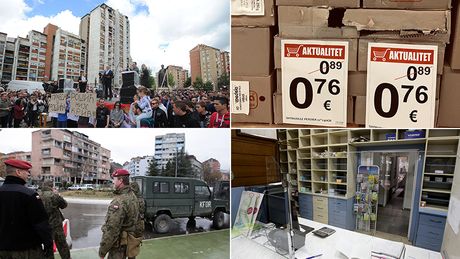One year ago, Pristina imposed taxes of 100 percent on Serbian products: These are the consequences
The damage caused by this decision of the government of so-called Kosovo is immeasurable, experts claim, ranging from economic to political, that is, the suspension of the Belgrade-Pristina dialogue

Today is exactly one year since the government in Pristina imposed the 100 percent taxes on products from central Serbia and Bosnia and Herzegovina. The "trade war" started by Pristina actually began a few days earlier, first with the introduction of a 10 percent tax, that was then raised to 100 percent on November 21, 2018.
The damage caused by this decision of the government of so-called Kosovo is immeasurable, experts claim, and is also a 100 percent violation of the Free Trade Agreement CEFTA.
In economic terms, it is reflected in the reduction of trade and millions in financial damages on both sides of the administrative line, while in political terms it produced a blockade of the dialogue. Pristina remained persistent, although Brussels and Washington first, and then almost the entire international community, asked for the abolition of the taxes.
How did it all begin?
Pristina decided to make the move after suffering a fiasco in its Interpol membership bid, when the application was rejected during a session of the General Assembly of that international police organization held in Dubai.

The idea was to force Belgrade to halt its "campaign" for countries to withdraw their recognition of Kosovo's self-proclaimed independence - but over the past year, such diplomatic activity by Serbia has resulted in 15 countries withdrawing recognition of so-called Kosovo.
The Pristina authorities justified their decision by citing "an aggressive campaign against Kosovo." Then prime minister of so-called Kosovo, Ramush Haradinaj, informed the public via Facebook that the decision was effective immediately.
"The government of Kosovo today decided to impose a 100 percent tax on imported products originating in Serbia and Bosnia and Herzegovina, except for international brands listed in the annex. In addition, the government commits the Ministry of Trade and Industry and all relevant institutions to eliminate and prevent potential imports and market access of all products that are contrary to the official and constitutional name of the Republic of Kosovo. The decision is effective immediately - the competent institutions are under obligation to implement it immediately," Haradinaj wrote at the time.
This decision received considerable criticism from the European Union and other international representatives.
For the past year, Haradinaj and other representatives of the provisional institutions in Pristina have maintained that the taxes will remain in force until Belgrade recognizes Kosovo's independence.
Vucic: One of the most difficult situations in the last 10 years
A few hours after the decision of the government in Pristina, a session of the Council for National Security was held in Belgrade on November 21, after which Serbian President Aleksandar Vucic said that this was "one of the most difficult situations in the last 10 years."
"Pristina had four goals with these measures: the first is to exert the greatest pressure so far, that would lead to Belgrade's unconditional 'capitulation' and full recognition of independence, the second goal of the absolute ban on trade was to, in silence, carry out the most forceful and fastest ethnic cleansing and expulsion of Serbs from Kosovo both south and north of the Ibar," said Vucic.
The third reason for Pristina to take the measures was seen by Vucic in wanting to pressure international authorities and institutions to make some concessions on visa liberalization, and fourth, it is possible that some people may have intentions to bring about conflict and total destabilization of the region.
During the past year, the Serbian president has repeatedly said that Belgrade is ready to resume the dialogue immediately as soon as the taxes have been abolished. However, this did not happen.

Former Prime Minister of so-called Kosovo Ramush Haradinaj recently told his possible successor, Albin Kurti, that repealing the measure against Belgrade without it first recognizing Kosovo's independence, would be a "catastrophic political mistake."
Kurti is these days saying that he will not give up on the taxes and announcing reciprocity in relations with Belgrade, and expects not only the suspension of activities for withdrawals of recognition, but also a number of other things.
What economic damage has been done by Pristina's move?
Nine months after the introduction of the measure, goods worth 280,800,000 euros have not been shipped from central Serbia to the Kosovo territory, and today this amount is significantly higher.

On a daily level, this amounts to 1,075,000 euros.
Until the introduction of the taxes, goods worth 440 million euros were placed in the Kosovo market each year from central Serbia, while this year this amount is likely to exceed half a million euros.
Despite that, Belgrade did not resort to countermeasures, solely because of the fate of the people living in the Kosovo territory, as it would be difficult to find a measure that could affect one ethnic community.
(Telegraf.rs)
Telegraf.rs zadržava sva prava nad sadržajem. Za preuzimanje sadržaja pogledajte uputstva na stranici Uslovi korišćenja.




